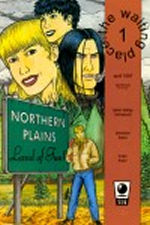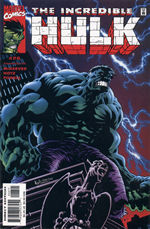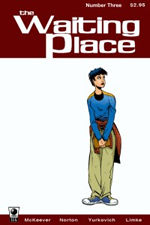>> Editorial: Cassandra Complex: Curtain Calls & Cyberpunx
>> Editorial: Cassandra Complex - Writers & Wringers
More...

Sean McKeever is probably best known as the writer of THE WAITING PLACE, a timeless and universal slice-of-life work revolving around high school life in smalltown America.
 THE WAITING PLACE has been critically acclaimed, won McKeever the 1997 Don Thompson/CompuServe New Talent award, and continues to garner praise from many industry professionals. Its themes of love, friendship and teenage alienation are universal.
THE WAITING PLACE has been critically acclaimed, won McKeever the 1997 Don Thompson/CompuServe New Talent award, and continues to garner praise from many industry professionals. Its themes of love, friendship and teenage alienation are universal.
Ironically, in any other industry such a work would almost certainly be regarded as commercial, mainstream fare. In comics, of course, this is not the case - and the great majority of comic readers have no idea who Sean McKeever is.
That changed earlier this year. In March 2001, the young 'unknown' penned an issue of Marvel's INCREDIBLE HULK, and soon after decided to seize the opportunity and plunge headlong into the frantic world of full-time freelancing.
So who is this man, and where is he from? Even a cursory reading of THE WAITING PLACE would make one assume that McKeever is all-too familiar with life in a small town...
'At seven, all I gave two shits about were Atari and comics.' He explains: "I come from a little tourist-trap town called Eagle River in Northern Wisconsin. My family moved there from Milwaukee when I was seven, so I knew that I was missing this fast-paced, exciting world, and living in Dullsville. Looking at it now, I can tell you it's quite beautiful and there are lots of fun, outdoors things to do. But as a kid of seven, all I gave two shits about were Atari and comics."
Did growing up in such a place foster his interest in comics especially? It's a common enough story: the artistic, alienated youngster who retreats into a world of four-colour imagination.
"No, I wouldn't say that," he replies. "I've been into comics for as long as I can remember. I learned to read at an early age from SPIDEY SUPER-STORIES and AMAZING SPIDER-MAN, and developed a pretty decent vocabulary for my age. My verbosity and learning skills pretty much topped off by age five, though." He laughs, "Dictionary.com and thesaurus.com have become my best friends.
"So I already loved comics but yeah, I retreated to my bedroom more than most other kids. I sat in there and read my comics over and over, or doodled, or played Atari - because fishing, boating, barbeques and all that sort of nature-driven stuff bored me to tears."
Was he a complete hermit?
"Oh no, don't get me wrong," he says. "I went outside and played with my older brother and sister. But they were the only other kids for miles, and they were four and six years older than I was. So they eventually got lives, and I was pretty much alone then."
Evidently life in Northern Plains (the setting for THE WAITING PLACE) isn't too far removed from McKeever's background at all. By extension, then, is the comic autobiographical?
He shakes his head in disagreement. "The vast majority of the series, maybe eighty percent or more, is fiction. There are some similarities between Northern Plains and Eagle River, but it's more a vague, atmospheric similarity than the concrete, physical type. The same goes for the people. Juston, Chris and Jeremy are based on real people, but other than that it's just amalgamations of personality types, looks and attitudes."
 So how did this smalltown boy get the big idea in his head that he could write comics one day?
So how did this smalltown boy get the big idea in his head that he could write comics one day?
"I went to college for theatre," says McKeever. "I wanted to be a film actor, so I figured theatre would be a good starting place. I'd always done quite well in local plays and state acting competitions, and I enjoyed it, so it made sense."
But things didn't go as planned for the would-be thespian. "Fast forward a couple years," he explains. "I'd taken all the acting courses, and I was starting to realize what my subconscious had probably already known for a year: this wasn't what I wanted. I floundered about in my fifth semester, trying different classes to figure out what to do with the rest of my life, and - well, after a few weeks, I just stopped going to class. I didn't really realize this until November, when it was too late. I was screwed."
By this time, McKeever was only attending one class regularly, and that was screenwriting. Instead of going to classes, he was writing plots for comic books. He even had his own "universe" of titles, written up in a thirty-page pitch. Did anything come of that?
"The universe? No, I never really did anything with that, though I still have some notes laying around. It was built around the premise that America becomes a church-state, an oppressive future run by a fairly evil fellow. When Christ - who's an alien in this - returns to Earth, he's put away in hiding and the nation's leader feeds off his power. That was the backdrop, and then there were four series that revolved around it - science-driven action dramas with some super-hero trappings. It would have been fun," he smiles. "I still plan to use some of the character ideas."
McKeever eventually dropped out of school, "before I was kicked out," but the idea had already been planted firmly in his mind. He was going to write comics; "Which I'd essentially already been doing for the past year or two! I'm thick like that," he laughs. "But this was the first time I looked at it seriously and said, 'yeah, okay - let's go with this.'"
'If I'd paid any attention to sales, TWP is the last thing I would've done.' Heading back home to Eagle River, McKeever spent a while working for his parents. "I actually ran my comics store - 250 square feet within my parents' hardware store - which I'd started when I was 15. That was really when THE WAITING PLACE started to take shape. I was wasting away in this dead-end town for 5 years, hanging out with high-schoolers, avoiding my classmates who'd stuck around as well, and being fairly miserable."
Contrary to what many may think, however, McKeever believes that working in retail gave him no advantages when it came to creating his own comics. "Hell, no. If I'd paid any attention to sales, TWP is the last thing I would've done. At the time, outside of STRANGERS IN PARADISE, the genre didn't make anyone any money. But I knew that I could make a slice-of-life comic that was utterly commercial for the masses, and that I would be happy with. And I think I did that."
It would be a while before that could happen, though. McKeever's first comic work came about through his involvement in the CompuServe comics forums in the early '90s. There, he met Paul Jenkins (then writing HELLBLAZER), who introduced him to Joe Pruett of Caliber Comics. Pruett liked the young writer, and soon McKeever had a few short stories published in the Caliber anthology NEGATIVE BURN: "A sci-fi thriller kind of thing, a political commentary, and a weird slice-of-life number," he explains.
It was for the last of these stories that McKeever teamed up with Brendon and Brian Fraim, and this collaboration continued with the first series of THE WAITING PLACE. Together, they completed the entire first issue of THE WAITING PLACE in time for the 1996 San Diego Comic-Con. At the Con, McKeever handed copies of the comic to a dozen publishers, including Dan Vado of Slave Labor Graphics. And two months later, he received a call: Slave Labor would publish the series.
The fact that the first issue was already completed was, he believes, "a big factor" in Slave Labor's decision to take on the comic. It seems that, since then, more and more young creators are seeing this route as a good way to approach publishers - similar to a band producing a demo tape, or a novelist submitting sample chapters. Does McKeever think this is indicative of a sea change within the industry?
"If it's indicative of anything, it's the wising up of indy creators," he replies. "Just as retailers have smartened up from the hobbyist cliché of the '80s and '90s, learning to keep light bulbs in all their ceiling lights and have a cash register instead of a cigar box, creators have realized that it takes dedication and self-confidence to break through."
He adds, "I also imagine that a lot of publishers have been burned by 'great talent' with 'great ideas' but no follow-through. It could be that publishers are requiring proof of drive before signing on the dotted line with a newcomer."
 One of THE WAITING PLACE's strengths is its well-rounded and believable characters. Scott, the lonesome video store owner, is often mistakenly believed to be based on McKeever himself, though this is not the case. But which characters in the comic does he identify least with?
One of THE WAITING PLACE's strengths is its well-rounded and believable characters. Scott, the lonesome video store owner, is often mistakenly believed to be based on McKeever himself, though this is not the case. But which characters in the comic does he identify least with?
"That's a tough question, because part of the reason I enjoy writing is that I seem to have this innate understanding of people's motivations. I can't justify others' actions, but I can see their justification in an instinctual sort of way, you know? But I'd say I probably identify least with Kyle. Personality-wise, he and I have next to nothing in common."
Are these sort of characters - the ones far removed from his own personality - harder to write?
"No, I don't think so. Sometimes it's harder to write the characters I'm more similar to, because I put myself in their shoes, and want to treat them like I'd treat me. And that's not fair to the story. As much as I rely on elements of my personality, I also try to stay out of it, if you get my meaning."
The second series of THE WAITING PLACE saw a change in artist (Mike Norton, with David Yurkovich on layout duty), and a slight raise in profile - enough, it seems, to land him a job with Marvel. Once again, Paul Jenkins (by now writing THE INCREDIBLE HULK) played a vital part: it was through him that McKeever discovered HULK editor Tom Brevoort was a regular reader of THE WAITING PLACE.
McKeever smiles: "Yes, Paul went in and pimped for me a bit. The fact that Tom had already been reading and enjoying TWP was the deal-maker: Tom assumed I was happy writing small-press drama, and I assumed Tom wouldn't be interested in a small-press drama writer..."
That was last summer, and spring of this year saw McKeever's first story in THE HULK. At time of writing, he's just finished a three-issue segment between July and September 2001, working from Jenkins' original story notes.
'I'm still trying to get used to the idea of doing lots of writing and then throwing it away.' With Volume 2 of THE WAITING PLACE drawing to a close, was it this success that inspired him to bite the bullet and go freelance? Or were other factors involved?
"I wanted to get out of web design, for one," He says. "It just wasn't the right full-time job for me: I'd come home without any creative juice left. I could hardly write. Also taking into account the fact that I'd saved up some rainy-day cash, and was about to write a few more issues of THE INCREDIBLE HULK, I decided to jump ship."
And now that his life has changed, does he have a 'typical working day' at home?
"No, as hard as I try," he smiles. "I get up around 10 AM, read some online stuff and e-mail... Other than that it's pretty much 'write when I can force myself to.'
"I'm still trying to get used to the idea of doing lots of writing and then throwing it away, or rewriting it. I'm someone who goes through two drafts tops: a rough draft and a finished draft. I do a lot of the writing in my head, and let it percolate. When I'm happy enough with a scene, or a page, or a bit of dialogue, then the dam bursts and I go to it. I'm having trouble with that 'fill the blank screen and do it now' scenario. But I'm getting better at it."

This article is Ideological Freeware. The author grants permission for its reproduction and redistribution by private individuals on condition that the author and source of the article are clearly shown, no charge is made, and the whole article is reproduced intact, including this notice.


